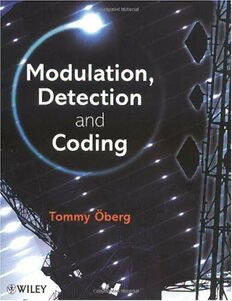Download Modulation, Detection and Coding PDF Free - Full Version
Download Modulation, Detection and Coding by Tommy Öberg in PDF format completely FREE. No registration required, no payment needed. Get instant access to this valuable resource on PDFdrive.to!
About Modulation, Detection and Coding
Telecommunications constitute an increasingly important part of human society. In some ways, they are a foundation on which industrial countries rely. Telecommunications play in numerous areas including, banking, air traffic control, medicine, digital and voice communications. More and more people need to understand the foundations of modern telecommunications.The purpose of this book is to give an introduction to coding and modulation methods as well as other signal processing within modern telecom-munica-tions, using basic starting points. The principal topics are source coding, channel coding, modulation and detection. Adaptive channel equalisers and adaptive antennas, which are important parts of the detection process in many systems, are also covered and there are sections about link budget, sychronisation, together with codes and detectors for CDMA. The aim is to give the reader an understanding of the basic functions in telecommunication systems and the methods that are used for the analysis of a complete system.Telecommunications is a field which develops quickly. An understanding of analysing methods which goes beyond simply an understanding of the results of the analysis is valuable knowledge - knowledge that will remain relevant over time and which will aid in understanding new developments as they arise.This text contains theory, fully solved examples, exercises with answers and a short presentation of some communication systems. Basic knowledge in signal processing and probability theory is a necessity to acquire the material. The book is intended for courses on at least the master level but can also be used for self study.
Detailed Information
| Author: | Tommy Öberg |
|---|---|
| Publication Year: | 2002 |
| ISBN: | 471497665 |
| Pages: | 481 |
| Language: | English |
| File Size: | 26.014 |
| Format: | |
| Price: | FREE |
Safe & Secure Download - No registration required
Why Choose PDFdrive for Your Free Modulation, Detection and Coding Download?
- 100% Free: No hidden fees or subscriptions required for one book every day.
- No Registration: Immediate access is available without creating accounts for one book every day.
- Safe and Secure: Clean downloads without malware or viruses
- Multiple Formats: PDF, MOBI, Mpub,... optimized for all devices
- Educational Resource: Supporting knowledge sharing and learning
Frequently Asked Questions
Is it really free to download Modulation, Detection and Coding PDF?
Yes, on https://PDFdrive.to you can download Modulation, Detection and Coding by Tommy Öberg completely free. We don't require any payment, subscription, or registration to access this PDF file. For 3 books every day.
How can I read Modulation, Detection and Coding on my mobile device?
After downloading Modulation, Detection and Coding PDF, you can open it with any PDF reader app on your phone or tablet. We recommend using Adobe Acrobat Reader, Apple Books, or Google Play Books for the best reading experience.
Is this the full version of Modulation, Detection and Coding?
Yes, this is the complete PDF version of Modulation, Detection and Coding by Tommy Öberg. You will be able to read the entire content as in the printed version without missing any pages.
Is it legal to download Modulation, Detection and Coding PDF for free?
https://PDFdrive.to provides links to free educational resources available online. We do not store any files on our servers. Please be aware of copyright laws in your country before downloading.
The materials shared are intended for research, educational, and personal use in accordance with fair use principles.

